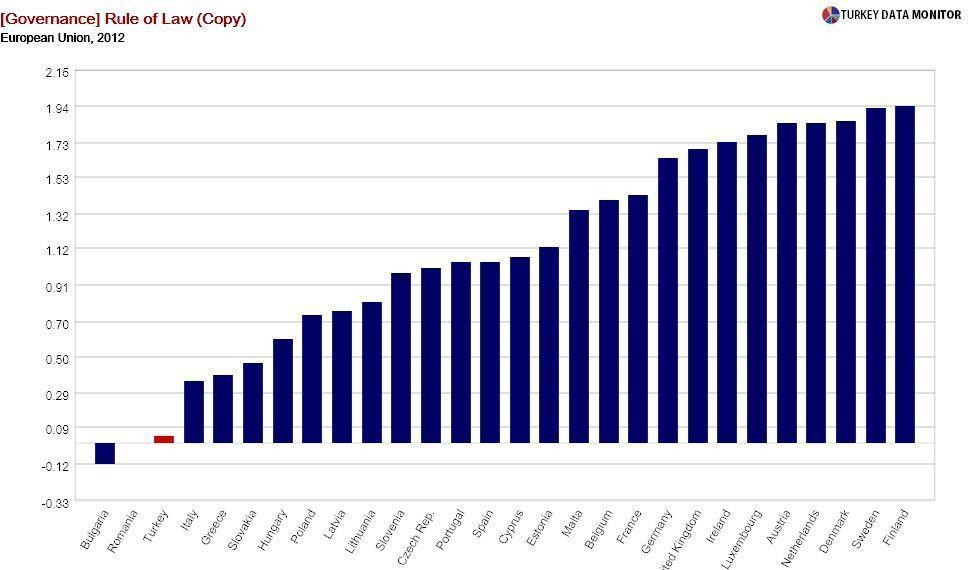Lawlessness to rule instead of rule of law
 Deputy Prime Minister Ali Babacan, who is in charge of coordinating economic policymaking, was on Turkish business channel Bloomberg HT a day after Finance Minister Mehmet Şimşek’s CNNTürk interview that I featured in my last column.
Deputy Prime Minister Ali Babacan, who is in charge of coordinating economic policymaking, was on Turkish business channel Bloomberg HT a day after Finance Minister Mehmet Şimşek’s CNNTürk interview that I featured in my last column.The economy tsar emphasized that the rule of law was the most important issue for Turkey in the medium to long-term. He also noted that if Turkey did not adopt the rule of law, it would be unable to develop its economy or improve its democracy. But what exactly does rule of law mean? As part of their Worldwide Governance Indicators (WGI) project, the World Bank has been measuring rule of law for every country since 1996, so let’s have a look at their definition.
According to the World Bank, “rule of law captures perceptions of the extent to which agents have confidence in and abide by the rules of society, and in particular the quality of contract enforcement, property rights, the police, and the courts, as well as the likelihood of crime and violence.”
We now know what the rule of law is, but how is it measured? The World Bank calculates indices for the rule of law and other governance indicators by gathering surveys and hard data from “a number of survey institutes, think tanks, non-governmental organizations, international organizations, and private sector firms.” The rule of law index itself is calculated from more than 80 separate variables from 23 sources.
You may also want to know how Turkey is faring compared to other countries. Turkey’s percentile rank has been hovering around 50, which means that the country is right in the middle of the pack.
However, since Babacan also said that Turkey holds the European Union as a benchmark for the rule of law, you may want to compare it with the countries in the union as well. Turkey’s rule of law index is significantly lower than all E.U. countries, except Bulgaria.

Since the World Bank’s definition is so broad, it’d be great if they provided sub-indices for the different main areas of the rule of law. Unfortunately, they don’t, but the World Justice Project, which is one of the sources used to construct the WGI index, does. They have eight categories comprising the rule of law, each of which is divided into several sub-categories. Turkey fares worst in criminal justice, fundamental rights and limited government powers.
In fact, the government has been trying to expand its powers further by restructuring the Supreme Council of Judges and Prosecutors (HSYK). Incidentally, Babacan also remarked that there needed to be a proper and well-functioning judicial system to implement the rule of law properly. I wish I could ask him if a judicial system run by the minister of justice, and effectively the prime minister, could be considered to be proper and well-functioning?
Even without having taken the latest developments into consideration, the existing data show that the rule of law is very weak in Turkey. If Prime Minister Recep Tayyip Erdoğan has his say, it will disappear, and lawlessness will rule instead.










